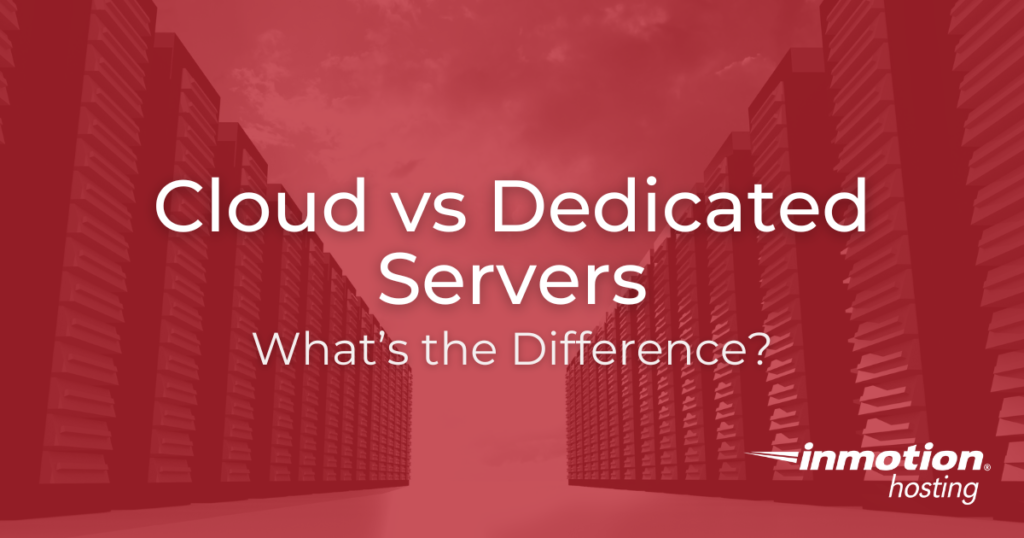
Deciding between cloud computing vs dedicated server is crucial for growing businesses. Before you choose, there are important aspects to consider: performance, scalability, cost, and security.
In this article, we’ll break down and compare each server type to help you make an informed choice for your company’s needs and goals.
What Are Cloud Servers?
Cloud servers are virtual servers running on a physical machine. Using virtualization, a user is provided a cloud environment. This offers scalable and cost-effective solutions for businesses hosting applications, websites, or data. With cloud hosting, users benefit from:
- Scalability on Demand: Instantly increase computing power, cloud storage, and bandwidth as needs grow.
- High Availability: Workloads are distributed across multiple servers, ensuring service continuity even if one server fails.
- Resource Pooling: Efficient use of shared resources reduces costs, as users only pay for what they use.
These features make the cloud ideal for businesses with fluctuating traffic or those looking to avoid upfront hardware expenses. With high flexibility, redundancy, and efficiency, cloud hosting supports business growth and fast responses to changing demands.
What Are Dedicated Servers?
A dedicated server is a physical server. They offer high-performance, single-tenant hosting and exclusive access to all resources. Unlike shared or cloud hosting, they provide full control over setup and security. This makes them ideal for businesses with specific needs. Learn more about dedicated servers here to understand their unique benefits, including:
- Dedicated Resources: Full CPU, RAM, and storage are allocated to one user.
- High Performance: Can handle demanding applications and heavy traffic.
- Customization: Businesses can fully tailor their hardware and software the way they want.
- Security: High, as no resources are shared with other users.
Dedicated servers suit organizations needing powerful hosting for critical applications or sensitive data. Although they require technical skills for management, they deliver unmatched performance and reliability.
Comparing Cloud Servers vs. Dedicated Servers
Choosing between a cloud server or a dedicated server depends on several factors. These include performance, scalability, cost, security, maintenance, and customization.
Let’s explore how these two options compare in each area.
Performance
Between cloud computing vs dedicated server performance, dedicated servers offer consistently high performance. Computing power, storage, and network bandwidth are dedicated to one user. They excel at handling applications requiring significant processing power and low latency. Thus, dedicated servers are highly ideal for resource-intensive tasks and high-traffic websites.
Cloud hosting offers solid performance but can be less predictable. Speed and efficiency depend on the underlying infrastructure and the number of users sharing server resources. So, while cloud servers can quickly adapt to meet demand, their performance may vary during peak usage times.
In sum, if your business requires reliable and steady performance, dedicated servers are often the better choice. However, cloud servers are a viable option for businesses with fluctuating resource needs.
Scalability
Cloud hosting options are much more flexible. Users can easily add or scale down resources and cloud storage. Thus, businesses can adapt quickly to traffic spikes and growth without investing in new hardware. This on-demand scalability is a major advantage for organizations that need to adapt to quickly changing resource demands.
In contrast, dedicated servers are less scalable. Users are limited to their physical server’s fixed resources. Scaling up requires upgrading the hardware or acquiring a new machine. This can be costly and time-consuming, making dedicated servers less ideal for businesses that expect rapid growth.
If your business needs easy and efficient scalability, cloud hosting is the superior choice here. Dedicated servers are better suited for those with stable and predictable resource requirements.
Cost
The pricing model for cloud servers vs dedicated servers is very different. Cloud hosting is typically pay-as-you-go, charging users based on actual resource usage. This can lead to cost savings for businesses with variable traffic patterns.
On the other hand, dedicated servers call for a large initial investment in hardware. Likewise, ongoing operational expenses for power, cooling, and maintenance also add up.
Even so, they can prove more economical in the long run for businesses that need consistent, high resource levels. Opting for a web host that offers dedicated server hosting can cut some of its associated costs. This is especially true for businesses that choose managed dedicated hosting services. Host providers, like InMotion Hosting, make housing, managing, and securing dedicated servers affordable.
Security
Dedicated servers provide enhanced data protection, making them the better choice for security. Users can tailor security protocols in their servers to meet specific compliance standards. This level of control is essential for businesses with stringent security requirements.
In contrast, cloud servers operate under a shared responsibility model. Cloud hosting providers will secure the underlying infrastructure. However, users are responsible for the security of their applications and data. Businesses handling sensitive data need to be more careful with choosing the right hosting provider.
Additionally, dedicated servers often have stronger physical security measures in place compared to public cloud options. Still, cloud servers may be suitable for businesses with effective security and are hosting with the right provider.
Maintenance and Support
Maintenance and support requirements differ significantly between dedicated hardware and a cloud environment. Dedicated servers demand more maintenance, including software updates, security patches, and hardware upkeep. This may warrant high levels of technical expertise and resources, which may be challenging for smaller businesses.
In contrast, cloud servers offload much of this responsibility to the provider. Businesses can focus on their core activities without worrying about server management. Cloud providers often have robust technical support and service level agreements (SLAs) that guarantee uptime and issue resolution. As a result, businesses can reduce operational burdens and still have reliable support. This can make cloud servers more convenient for those lacking extensive IT resources.
Customization
When considering cloud computing or dedicated server solutions, customization is a crucial factor. Dedicated servers provide users with complete control over both hardware and software configurations. This level of customization is essential for applications requiring specific setups. Businesses are more empowered to optimize performance based on their unique needs.
In contrast, cloud solutions offer limited customization. Customization is often dictated by the provider’s infrastructure and services. While users can select from predefined options, they may face limits that inhibit their hosting needs. So, for businesses with specialized needs, dedicated servers are often the better choice for unique configurations.
Cloud Computing vs Dedicated Server: Which Is Right for You?
Whether you choose a cloud server or a dedicated server depends on your business needs and goals. Here are key considerations to help you make the best decision:
| Factor | Cloud Servers | Dedicated Servers |
|---|---|---|
| Performance | Variable; can adjust based on needs | Consistent high performance |
| Scalability | Easily scale up or down | Limited; requires manual upgrades |
| Cost | Pay-as-you go; cost-effect for varying workloads | Higher upfront costs but better for steady needs |
| Security | More responsibility on user for security | Strong security features and compliance certifications |
| Maintenance | Provider manages infrastructure | May require hands-on maintenance for hardware and networking |
- Performance Needs:
- If your applications need consistent high performance, a dedicated server is ideal.
- For businesses with fluctuating performance demands, cloud servers offer more flexibility.
- If your applications need consistent high performance, a dedicated server is ideal.
- Scalability:
- Fast-growing businesses with unpredictable traffic will enjoy the on-demand scalability of cloud servers.
- Dedicated servers need manual upgrades, which can be time-consuming and costly.
- Fast-growing businesses with unpredictable traffic will enjoy the on-demand scalability of cloud servers.
- Budget Considerations:
- The Cloud’s pay-as-you-go model makes it budget-friendly for businesses with varying workloads.
- Dedicated servers have higher upfront costs but are more economical for companies with consistent resource needs.
- The Cloud’s pay-as-you-go model makes it budget-friendly for businesses with varying workloads.
- Technical Expertise:
- Consider your team’s technical capabilities. Dedicated servers require in-depth knowledge for management and maintenance.
- Cloud servers allow providers to handle most management tasks, freeing up your IT staff for other priorities.
- Consider your team’s technical capabilities. Dedicated servers require in-depth knowledge for management and maintenance.
- Security Requirements:
- Businesses handling sensitive data may prefer dedicated servers for enhanced control and security.
- However, many cloud providers offer robust security features and compliance certifications.
- Businesses handling sensitive data may prefer dedicated servers for enhanced control and security.
By evaluating these factors—performance, scalability, budget, technical expertise, and security—you can make an informed choice that aligns with your IT strategy and supports your business growth.
Final Thoughts
Choosing between cloud computing vs dedicated server options comes down to your business’s needs. Think about performance, flexibility, budget, security, and technical skills to make the best choice. If you need high performance and control, check out InMotion Hosting’s dedicated server plans to see how we can support your business growth.
Frequently Asked Questions
What is the difference between cloud and dedicated servers?
Cloud servers share hardware resources and are virtualized. Dedicated servers provide exclusive access to physical hardware.
Cloud servers offer more flexibility and scalability. Meanwhile, dedicated servers deliver maximum performance and control.
Are cloud servers cheaper than dedicated?
Cloud servers can be more cost-effective than dedicated servers, especially for variable workloads. However, high-traffic, resource-intensive applications may be cheaper to run on dedicated servers. Pricing depends on the specific configurations and requirements.
Do cloud servers have a physical location?
Yes, even though cloud servers are virtualized, the underlying hardware lives in physical data centers. Cloud providers, like InMotion Hosting, have globally distributed data centers. This delivers high availability and low latency.
Who manages cloud servers?
Typically, cloud service providers manage your cloud server, including hardware, networking, and virtualization. Users are responsible for managing the operating system, applications, and data. Some providers also offer fully managed services that handle a bit more like security and monitoring.
Why should you use a dedicated server over cloud-based?
Dedicated servers are ideal for workloads that need the utmost in performance, security, and control. Industries with strict compliance requirements often use dedicated servers. Additionally, high-traffic websites and applications with consistent usage patterns can benefit from the reliable performance of dedicated servers.
